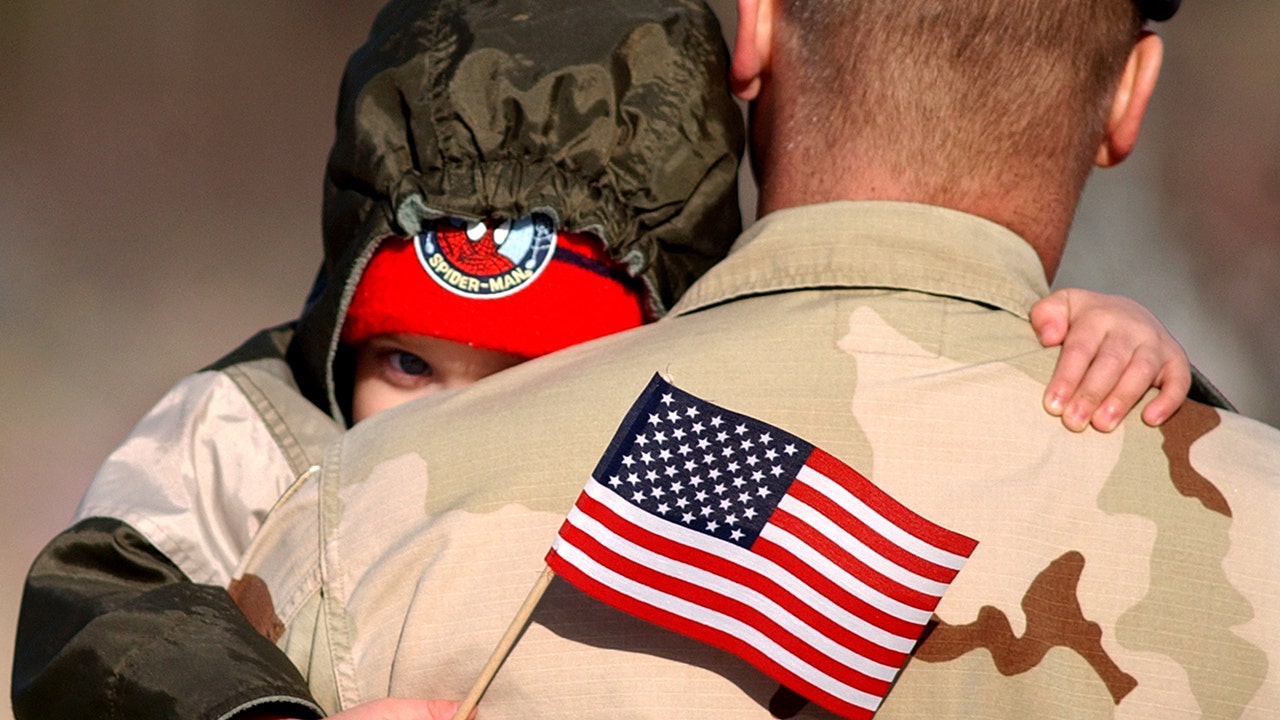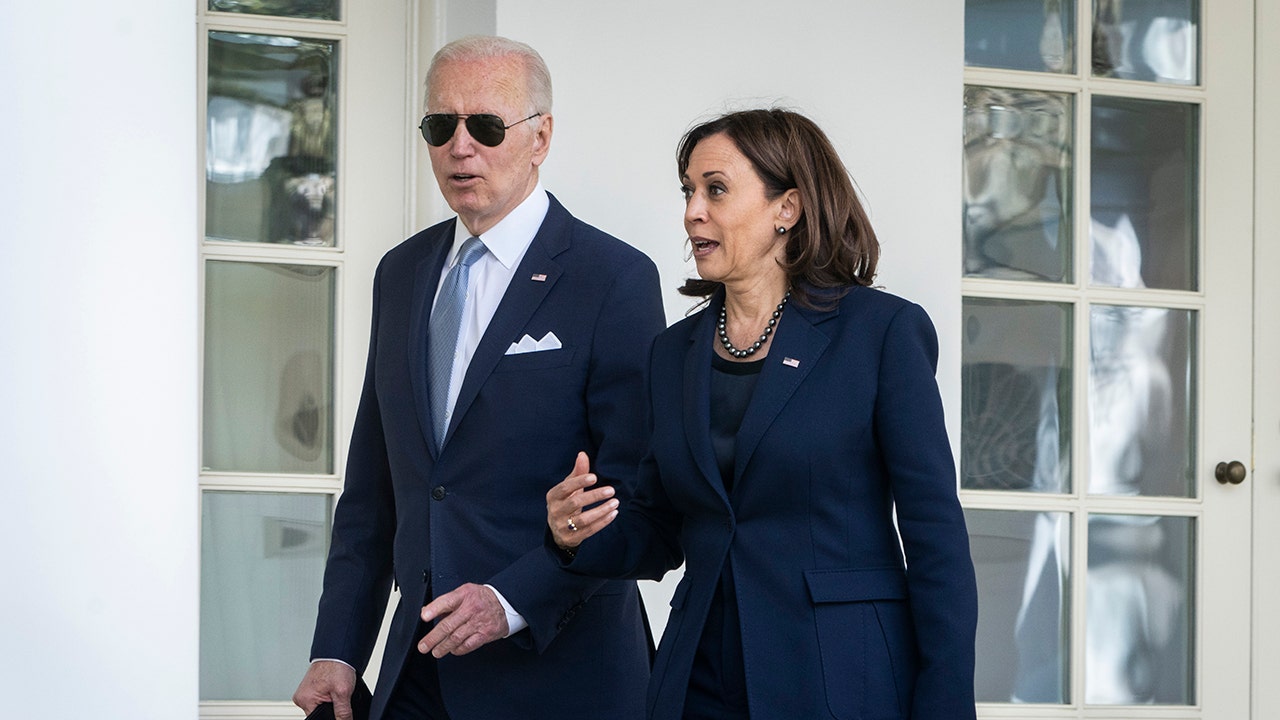This story discusses suicide. If you or someone you know is having thoughts of suicide, please contact the Suicide & Crisis Lifeline at 988 or 1-800-273-TALK (8255).
FIRST ON FOX: Suicide among veterans is a well-known national crisis. But a Fox News Digital deep dive into the numbers paints a disturbing picture that shows male veterans committing suicide at an alarming rate — a rate that has gotten very little attention in the national media.
American male veterans kill themselves in shockingly disproportionate numbers compared to civilians.
WITH THEIR MILITARY SON LOST TO SUICIDE, PARENTS SHARE A PATH TO HEALING — AND HELPING OTHERS
The suicide ratio among civilians is 4 to 1, male to female.
Yet the suicide ratio among veterans is 24 to 1, male to female.
A soldier returns home to hug his child after serving overseas. (Stephen Morton/Getty Images)
These data points come from the Centers for Disease Control and Prevention (CDC) and the Veterans Administration.
In many cases, family crises that follow military service can be the catalysts that lead to break-ups, divorces and painful battles over their children — pushing too many to suicide.
“About 90% of veteran suicides come in the immediate wake of a family incident,” said Jen Satterly, co-founder of All Secure Foundation in St. Louis, Missouri, which assists veterans who are battling post-traumatic stress (PTS) through education, resources and retreats.
Co-founder Tom Satterly, her husband, is a highly decorated combat veteran whose experiences were captured in the film, “Black Hawk Down.”
Said Jen Satterly, “Veterans aren’t thinking about the war when they take their lives.”
A despondent soldier speaks with a therapist. One expert said that far too often, former military who experience mental health challenges “see suicide as a way to eliminate the problem.” (iStock)
“They’re literally thinking, ‘I must be a monster and my family is better without me.’”
She added, “The military taught them how to eliminate problems and how to use a gun. They see suicide as a way to eliminate the problem.”
Hastened by many factors
The path to depression and suicide for veterans can be hastened by numerous factors, experts suggested.
Among them are long periods of time spent away from home, spouses and children — a situation that is stressful even in the healthiest of circumstances.
COMBAT VETERAN AND HIS WIFE HELP OTHERS FIGHT PTSD — AND FIND HEALING AND HOPE
Yet the prolonged and challenging separations can often lead to failed relationships for veterans, including the trauma of divorce and the loss of regular access to their young children, including through custody battles.
Families of soldiers who died by suicide hold signs in support of their loved ones during the Veterans Day Parade on Nov. 11, 2021, in New York City. (Spencer Platt/Getty Images)
The lingering stress of combat is also a factor.
Men accounted for 95% of all veteran suicides in 2021.
They accounted for 80% of suicides among civilians.
“Losing custody of your kids is often the final straw,” Dr. Kathy Nickerson, PhD, a California-based clinical psychologist and author who specializes in relationships told Fox News Digital.
“[Many people] can only experience so much pain before they decide they can’t take it anymore and look for a way out,” she said — also noting that “courts have historically favored moms.”
She added that the pain of loss is especially acute for veterans whose relationships with significant others and children often suffer greatly when they’re deployed overseas.
U.S. Marines clear houses at a site where insurgents killed one American and wounded others, Nov. 23, 2004 in Fallujah, Iraq. (Scott Peterson/Getty Images)
“The worst thing you can do to a parent is take away their kids,” Jim, a combat veteran from Massachusetts, told Fox News Digital (he asked that his last name be omitted for privacy).
“It’s the one thing in the world that will make you happy — and when you can’t see them anymore, you lose hope.”
He has a young daughter, he said, and can only see her for less than 24 hours per month.
‘SLEEP DISORDER DROVE MY SON TO SUICIDE,’ NEW YORK MOTHER SAYS: ‘BROKE MY HEART’
Jim said he felt extremely despondent recently — and that he spent 30 minutes on the phone not long ago with a suicide prevention expert.
Anthony Cancel of New Jersey is the founder of Pro Se Dad, a nonprofit organization devoted to rights for fathers.
He told Fox News Digital about many veterans, “They’re struggling as they reactivate back into society, and they’re having issues with housing and employment — and then their whole family situation, the nucleus of their life, explodes.”
Tom Satterly is a highly decorated combat veteran who was portrayed in the Oscar-winning 2001 film “Black Hawk Down,” about the 1993 battle in Somalia. He and his wife, Jen Satterly, founded the All Secure Foundation to help veterans facing issues such as post-traumatic stress. (All Secure Foundation)
Depression and even thoughts of suicide, Cancel suggested, are natural responses for any parent who can’t see their kids, male or female, veteran or not.
Another veteran, Joseph of Massachusetts (last name omitted), said he has grown hopeless because he cannot see his children and said he feels both financially and emotionally bankrupt.
Still another veteran with whom Fox News Digital spoke said that because he only rarely sees his children due to a marital dispute, he has considered suicide as a way to end his pain.
AI TECH IDENTIFIES SUICIDE RISK IN MILITARY VETERANS BEFORE IT’S TOO LATE: ‘FLIPPING THE MODEL’
“I have less than $200 to my name … I am now transient at best, not knowing where I will be staying next. Clearly, my efforts and life are not worth anything,” he said with heartbreaking bluntness.
Female veterans are hurting, too
America’s female veterans face serious mental health struggles, too, and are even more likely as a percentage of the former service member population to attempt suicide, according to the Veterans Administration.
But state-by-state data as reported by the VA tells a story of devastation among men who served our nation in uniform.
A trumpeter from the U.S. Navy Ceremonial Band plays “Taps” during military funeral honors at Arlington National Cemetery. (U.S. Army photo by Elizabeth Fraser/Arlington National Cemetery)
In 21 states, the number of female veterans who committed suicide may have been zero (the VA gives a range of data in states where less than 10 female veterans took their own lives, citing privacy concerns).
In Arizona, the disparity in suicides was as high as 240 men to 1 woman among veterans in 2021.
VET WHO LOST MILITARY ‘BROTHERS’ TO POST-WAR SUICIDE CALLS FOR URGENT CHANGE: ‘WE COULD DO BETTER’
California is one of 14 states in which the VA provides totals for both veteran men and women: Twenty men took their lives for every 1 woman in 2021.
In Pennsylvania and Texas, the ratio for veteran suicides, male to female, was 21.4 to 1.
“One veteran suicide is one too many and we at VA will stop at nothing to prevent these tragedies and save veterans’ lives,” Veterans Administration spokesperson Terrence Hayes said in a statement sent to Fox News Digital in response to a request for comment.
CLICK HERE TO SIGN UP FOR OUR LIFESTYLE NEWSLETTER
“Our top clinical priority is to offer comprehensive support that is designed to save lives and get veterans the world-class care they need, wherever they need it, whenever they need it.”
Service members who struggle with PTSD are often encouraged to seek help by the military and by society at large.
When their treatment is followed by battles to see their children amid marital breakups, some veterans claim their mental health background, including appointments and therapy, can be used against them. (iStock)
But when their treatment is followed by battles to see their children amid breakups and divorces, some veterans claim their mental health background, including appointments and therapy, can be used against them.
“We’re told to seek treatment,” said Jim, the veteran from Massachusetts, who said he was treated for PTS after serving in Iraq.
But “you have no idea it’d be used to keep you from your kids,” he said.
For more Lifestyle articles, visit www.foxnews.com/lifestyle.
Kerry J. Byrne is a lifestyle reporter with Fox News Digital.



